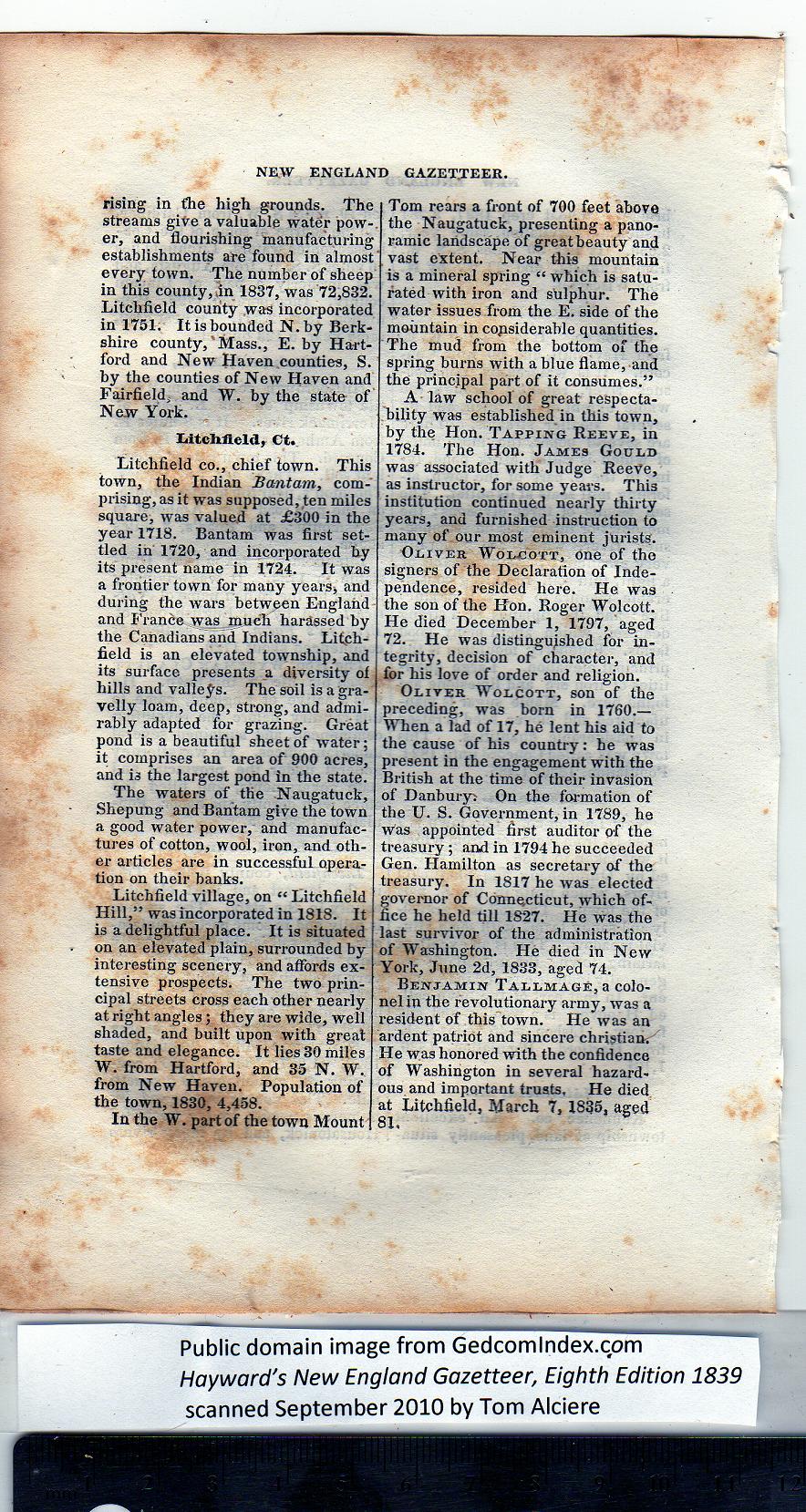|
rising in the high grounds. The
streams give a valuable water pow-.
er, and flourishing manufacturing
establishments are found in almost'
every town. The number of sheep
in this county, in 1837, was 72,832.
Litchfield county was incorporated
in 1751. It is bounded N. by Berk-
shire county,'Mass., E. by Hart-
ford and New Haven counties, S.
by the counties of New Haven and
Fairfield* and W. by the state of
New York.
Litchfield, Ct*
Litchfield co., chief town. This
town, the Indian Bantam, com-
prising, as it was supposed, ten miles
square, was valued at £300 in the
year 1718. Bantam was first set-
tled in 1720, and incorporated by
its present name in 1724. It was
a frontier town for many years, and
during the wars between England
and France was mueh harassed by
the Canadians and Indians. Litch-
field is an elevated township, and
its surface presents a diversity of
hills and valleys. The soil is a gra-
velly loam, deep, strong, and admi-
rably adapted for grazing. Great
pond is a beautiful sheet of water;
it comprises an area of 900 acres,
and is the largest pond in the state.
The waters of the Naugatuck,
Shepung and Bantam give the town
a good water power, and manufac-
tures of cotton, wool, iron, and oth-
er articles are in successful opera-
tion on their banks.
Litchfield village, on “ Litchfield
Hill,” was incorporated in 1818. It
is a delightful place. It is situated
on an elevated plain, surrounded by
interesting scenery, and affords ex-
tensive prospects. The two prin-
cipal streets cross each other nearly
at right angles; they are wide, well
shaded, and built upon with great
taste and elegance. It lies 30 miles
W. from Hartford, and 35 N. W.
from New Haven. Population of
the town, 1830, 4,458.
In the W. part of the town Mount |
Tom rears a front of 700 feet above
the Naugatuck, presenting a pano-
ramic landscape of great beauty and
vast extent. Near this mountain
is a mineral spring “ which is satu-
rated with iron and sulphur. The
water issues from the E. side of the
mountain in considerable quantities.
The mud from the bottom of the
spring burns with a blue flame, and
the principal part of it consumes.”
A law school of great respecta-
bility was established in this town,
by the Hon. Tapping Reeve, in
1784. The Hon. James Gould
was associated with Judge ReeVe,
as instructor, for some years. This
institution continued nearly thirty
years, and furnished instruction to
many of our most eminent jurists.
Oliver Wolcott, one of the
signers of the Declaration of Inde-
pendence, resided here. He was
the son of the Hon. Roger Wolcott.
He died December 1, 1797, aged
72. He was distinguished for in-
tegrity, decision of character, and
for his love of order and religion.
Oliver Wolcott, son of the
preceding, was bom in 1760.—
When a lad of 17, he lent his aid to
the cause of his country: he was
present in the engagement with the
British at the time of their invasion
of Danbury* On the formation of
the U. S. Government, in 1789, he
was appointed first auditor of the
treasury; and in 1794 he succeeded
Gen. Plamilton as secretary of the
treasury. In 1817 he was elected
governor of Connecticut, which of-
fice he held till 1827. He was the
last survivor of the administration
of Washington. He died in New
York, June 2d, 1833, aged 74.
Benjamin Tallmage,3 colo-
nel in the revolutionary army, was a
resident of this town. He was an
ardent patriot and sincere Christian.
He was honored with the confidence
of Washington in several hazard-
ous and important trusts. He died
at Litchfield, March 7, 1835j aged
81, |
